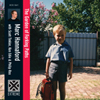 Accessible, improvisational jazz is given new life at the hands of this exceptional quartet. Australian pianist Marc Hannaford leads his group through a variety of musical approaches, drawing a lively dialogue out of each of them that entertains with ease. This quartet reaches deep into their imaginative bag of tricks and pull out one stunning performance after another.
Accessible, improvisational jazz is given new life at the hands of this exceptional quartet. Australian pianist Marc Hannaford leads his group through a variety of musical approaches, drawing a lively dialogue out of each of them that entertains with ease. This quartet reaches deep into their imaginative bag of tricks and pull out one stunning performance after another.
Extreme
In some ways it seems all too easy to release an album of improvised music. With the advent of cheap recording it is possible for almost anyone to assemble a bunch of half-assed recordings produced over the course of a few extended jams and call it an album. Woe to the thoughtless noise-maker indeed, for his kind is populating the internet with increasing regularity. I expected so much from Marc Hannaford. I must admit a certain amount of cynicism when it comes to modern jazz recordings; all too often they favor technique over content and, as is the case with other genres that claim improvisation as a cornerstone of their craft, fail to provide much to appreciate beyond the technique itself. Hannaford, Scott Tinkler, Ken Edie, and Philip Rex know a thing or two about improvisation, however. They exhibit a thoughtfulness in their play that the likes of Albert Ayler and John Coltrane recognized as invaluable to the art form. With an eye on certain compositional principles and methodologies, each member of this quartet contributes their own character and reason to eight superb recordings of controlled chaos.
"Sauna Twins" begins with Hannaford's incongruous and drunken piano playing; he stumbles and careens across his ivory keys in seemingly random jumps, ranting with a persistent vigor that pretends coherence. Philip Rex soon answers his call on bass, entering open spaces in the conversation with light jabs and punchy deliveries. It's not hard to imagine that the two musicians are in conversation with each other, one calling out in a certain chord, the other responding with a quick urgency. The addition of Edie's drums and Tinkler's trumpet suddenly clouds this exchange, but soon each musician falls in with the other, filling in the gaps that one or the other leaves. In no time at all (and without introduction), the massive "G.E.B." is in full swing. The instruments have, in the span of just over four minutes, become characters of their own. Sometimes they compliment each other by falling into near silence together, other times they appear to argue, one yelling in order to claim dominance, the other three huddling together before launching a counter-attack. The beauty of many of these performances is that they feel genuinely organic, like the best written dialogues. For all the random components at play, however, there is a unifying theme at work in the background, a theme that each of the musicians manage to keep in mind as they parade through their own musical arguments.
Clocking in at over 17 minutes long, one might expect "G.E.B" to become boring or overwrought, but each of its varied movements not only seem necessary, they're downright beautiful. Tinkler's trumpet performance, especially in the last five minutes or so, is nearly epic in all its 64th-note glory. Rex's percussive force is immense, his hands creating a virtual parade of power throughout the entire piece. It might be argued that "G.E.B." lays too many cards on the table too early; both "Pure Evil" and "All Booze" seem small in its shadow, but both are appealing and set the rest of the record up quite well. The initial and deceptive calm of "I'll Go Down..." (Hannaford's solo piano performance) is all the more powerful because of the way it contrasts with "All Booze" and "Pure Evil" features some pseudo-funky bass and drum explosions that'd make Squarepusher more than just a little jealous. There is a lot going on throughout The Garden of Forking Paths. It is equally diverse, random, tight, well-conceived, and welcoming. I'm as impressed with the music as I am with the technique that spawned it.
samples:
Read More

